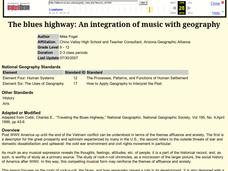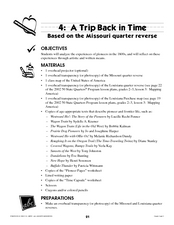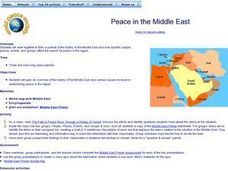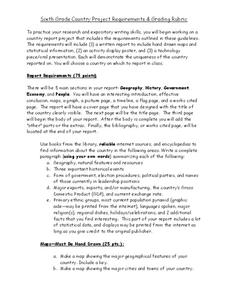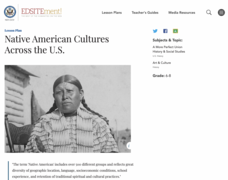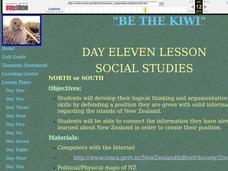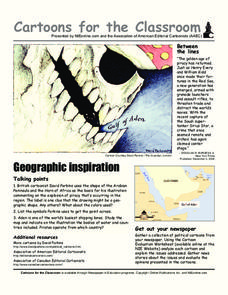Curated OER
A Visit to China
Sixth graders study the history of China. They explore the Chinese people, the Great Wall of China, religions, government and Dynasties. In groups, 6th graders collect information on China. They write a report on their findings and...
Curated OER
Ann Arbor Growth & Immigration
Third graders describe some of the factors that brought early settlers to Ann Arbor. They read Narrative-A Trip from Utica, New York, to Ingham County, Michigan in 1838. As an added challenge, 3rd graders can use maps to track Silas...
Curated OER
The blues highway: An integration of music with geography
Young scholars analyze the movement of the blues from rural Mississippi to urban Chicago and how place and the environment affected the development of the blues. They define the blues, where it originated and how and why it moved to...
Echoes & Reflections
Antisemitism
Propaganda and anti-semitism were linked to evil ends during the Holocaust. Using video testimony of Holocaust survivors, examples of Nazi propaganda, and discussion questions, learners explore the roots of anti-semitism in Europe and...
National Endowment for the Humanities
The War in the North, 1775–1778
Using primary source documents, including maps, learners examine Revolutionary War events from 1775 to 1778. The focus here is on the challenges George Washington and the Continental army faced and how they persevered in spite of those...
Curated OER
Understanding Stereotypes
Pupils confront age-related stereotypes, explore how stereotyping impacts their lives, and discuss how they can make changes to reduce over-generalizations, unfair assumptions, and critical judgments about people groups. They use a...
Curated OER
World War II
Offering a comprehensive overview of the beginning of World War II, this resource could be a useful addition to a unit on this topic. It could be used as a way to lead a discussion on the war, or as a review tool before a test. Either...
Curated OER
A Trip Back in Time: Missouri quarter reverse
I love time capsules. After reviewing elements of pioneer life, your class will create a time capsule that would have belonged to a pioneer in the 1830s. Each person must write a description of each item they would have brought and why...
Curated OER
The Path of the Black Death
Students analyze maps, firsthand accounts, and archival documents to trace the path and aftermath of the Black Death. Connections between the plague and changes adopted by the ruling class are explored in this lesson.
National Endowment for the Humanities
The War in the South, 1778–1781
The second in a three-part look at the Revolutionary War focuses the years from 1778 through 1781 and zooms in on military operations in the southern colonies, the French alliance, and the role African-Americans played in events. Class...
Curated OER
Peace in the Middle East
Students study a region. In this history lesson, students discover how different people and events have affected the Middle East in its efforts to be a peaceful area. They work in small groups on an assigned topic and present their...
Mesa Public Schools
Country Project
Give your young learners the chance to discover more about countries in their world community with a research project. Class members write reports on an assigned country and include such major features as geography, important historical...
American Museum of Natural History
What Do You Know About Archaeology?
A 10-question interactive permits young anthropologists to study the field of archaeology and the tools archaeologists use to dig into history.
School Rack
Westward Expansion Project Choices
What a great list of brief research projects for reviewing the era of westward expansion in the United States! Learners are directed to choose and complete three of the projects on the given list, which includes opportunities to design...
College Board
2003 AP® Human Geography Free-Response Questions
What role has tourism played in changing the landscape of a country? How do human migration patterns affect a nation? To what extent can urban development patterns help us understand our cities? Learners explore these ideas and more...
National Endowment for the Humanities
Native American Cultures Across the U.S.
Students examine how American Indians are represented in today's society. They read stories, analyze maps, and complete a chart and create an illustration about a specific tribe.
Curated OER
Be the Kiwi
Compare the North and South of New Zealand. Exploritive minds identify which island is better to live on, taking into consideration such things as social, political, and economic aspects. They research an argument to present and debate...
Curated OER
Cartoons for the Classroom: Geographic Inspiration
A wonderfully graphic cartoon entices learners to read more about issues near the Arabian Peninsula. They will use the provided cartoon and critical thinking question to practice building their analytical and critical thinking skills....
Curated OER
The Countries of Latin America
Fifth graders study the geography, culture, government and economy of Latin American countries. They work in groups to fill out a profile describing their Latin American country. They listen to a reading of Latin American folktales and...
Channel Islands Film
Cache: Lesson Plan 4 - Grades 4-5
After viewing the West of the West's documentary Cache, individuals craft either a newspaper article chronicling the discovery of the cache on San Nicolas Island, a historical narrative of the placement of the cache in the cliff side, or...
Beverly Hills High School
Congress of Vienna 1815
Europe was changing in the early nineteenth century, and the Congress of Vienna largely sought to slow and contain those sweeping changes. A slideshow presentation illustrates the details of the Congress of Vienna, including its three...
American Museum of Natural History
Being an Archeologist: Chuck Spencer
Meet Chuck Spencer, an archeologist who studies the Zapotec people who lived in the Valley of Oaxaca, Mexico over 2000 years ago. Spencer shares in print his response to questions posed by kids.
National Endowment for the Humanities
Lesson 1: On the Road with Marco Polo: A Boy in 13th Century Venice
Learners investigate Marco Polo's life as a young boy in 13th century Venice. They analyze maps, explore various websites, complete a chart and answer discussion questions, and create a travel brochure about visiting 13th century Venice.
Curated OER
Today's World
While not an exhaustive review of globalization and trade, this overview of the inter-related nature of the economy would be a good tool to use in the classroom. This resource could be used to begin a discussion on the various topics...




